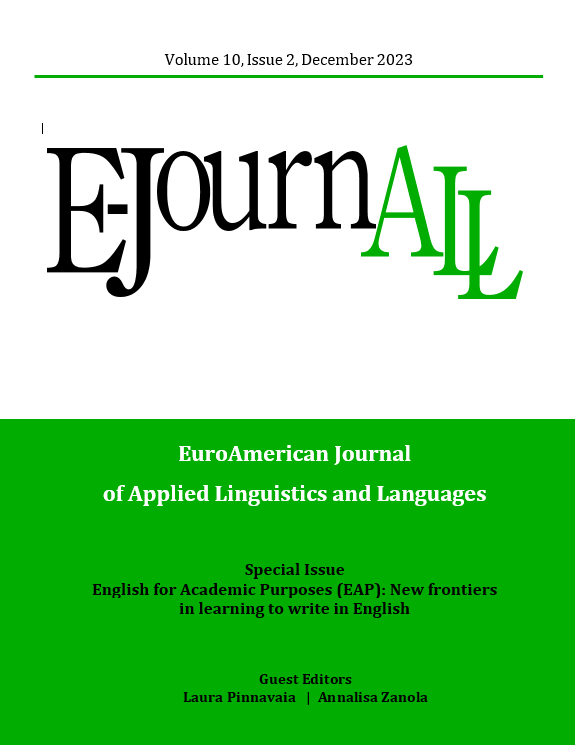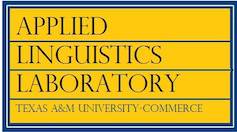English for Academic Purposes (EAP): new frontiers in learning to write in English
DOI:
https://doi.org/10.21283/2376905X.1.10.2.2954References
Bailey, Stephen (2006). Academic writing: a handbook for international students (2nd ed.). Routledge.
Breeze, Ruth (2012). Rethinking academic writing pedagogy for the European University. Rodopi.
Bourdieu, Pierre, Passeron, Jean-Claude & De Saint Martin, Monique (1995). Academic discourse. Linguistic Misunderstanding and professorial power. Polity Press.
Coiro, Julie, Knobel, Michele, Lankshear, Colin & Leu, Donald J. (2008). Central issues in new literacies and new literacies research. In Julie Coiro, Michele Knobel, Colin Lankshear & Donald J. Leu (Eds.), Handbook of Research on New Literacies (pp. 1-21). Lawrence Erlbaum.
Dalton-Puffer, Christiane (2008). Outcomes and processes in Content and Language Integrated Learning (CLIL): current research from Europe. In Werner Delanoy & Laurenz Volkmann (Eds.), Future perspectives for English language teaching (pp. 139-157). Carl Winter.
Devitt, Amy (2009). Teaching critical genre awareness. In Charles Bazerman, Adair Bonini & Debora Figueiredo (Eds.), Genre in a changing world. perspectives on writing (pp. 337–351). The WAC Clearinghouse and Parlor Press. Retrieved from http://wac.colostate.edu/books/genre/
Coxhead, Averil (2011). The Academic Word List 10 years on: research and teaching implications. TESOL Quarterly, 45(2), 355-362. https://doi.org/10.5054/1q.2011.254528
Elbow, Peter (1994). What do we mean when we talk about voice in writing? In Kathleen Yancey (Ed.), Voices on voice. perspectives, definition, inquiry (pp. 1-35). National Council of Teachers of English.
Fitzmaurice, Marian (2010). Considering teaching in higher education as a practice. Teaching in Higher Education, 15(1), 45-55. https://doi.org/10.1080/13562510903487941
Golden, Anne, Kulbrandstad, Lars. Anders, and Zhang, Lawrence Jun (Eds.) (2021). Crossing borders, writing texts, being evaluated: cultural and disciplinary norms in academic writing. Multilingual Matters. https://doi.org/10.21832/9781788928571
Golden, Anne & Kulbrandstad, Lars Anders (2021). Crossing borders. In Anne Golden, Lars Anders Kulbrandstad & Lawrence Jun Zhang (Eds.), Crossing borders, writing texts, being evaluated: cultural and disciplinary norms in academic writing (pp. 1-17). Multilingual Matters.
Hirst, Paul H. (1998). Educational theory. In Martyn Hammersley (Ed.), Educational research: current issues (Vol. 1) (pp. 149-159). The Open University/Paul Chapman Publishing.
Hyland, Ken (2000). Disciplinary discourses: social interaction in academic writing. Pearson Education
Hyland, Ken (2006). The ‘Other’ English: thoughts on EAP and academic writing. The European English Messenger, 15(2), 34-57.
Kruse, Otto (2013). Perspectives on academic writing in european higher education: genres, practices, and competences. Revista de Docencia Universitaria. REDU, 11(1), 37-58. https://doi.org/10.4995/redu.2013.5591
Kruse, Otto & Chitez, Madalina (2012). Schreibkompetenz im Studium: Komponenten, Modelle und Assessment. In Ulrike Preusser & Nadja Sennewald (Eds.), Literale Kompetenzentwicklung an der Hochschule (pp. 57-84). Peter Lang.
Lea, Mary R. & Street, Brian V. (1998). Student writing in higher education: an academic literacies approach. Studies in Higher Education, 23(2), 157-172. https://doi.org/10.1080/03075079812331380364
Leu, Donald J., Zawilinski, Lisa, Castek, Jill, Banerjee, Manju, Housand, Brian C., Liu, Yingjie, & O’Neil, Maureen (2007). What is New about the New Literacies of Online Reading Comprehension?. In Leslie S. Rush, Jonathan Eakle & Allen Berger (Eds.), Secondary School Literacy: What Research Reveals for Classroom Practices (pp. 37-68). National Council of Teachers of English.
Lillis, Theresa, Harrington, Kathy, Lea, Mary R., & Mitchell, Sally (Eds.) (2015). Working with Academic Literacies: Case Studies towards Transformative Practices. The WAC Clearinghouse/Parlor Press. http://wac.colostate.edu/books/lillis/
Macfarlane, Bruce (2021). Methodology, Fake Learning, and Emotional Performativity. ECNU Review of Education. https://doi.org/10.1177/2096531120984786
Matsuda, Paul & Tardy, Christine (2008). Continuing the conversation on voice in academic writing. English for Specific Purposes, 27, 100-105. https://doi.org/10.1016/j.esp.2007.04.002
Molinari, Julia (2022). What makes writing academic. Bloomsbury Academic.
Nelson, Nancy & Castelló, Montserrat (2012). Academic writing and authorial voice. In Montserrat Castelló & Christiane Donahue (Eds.), University writing. Selves and texts in academic societies (pp. 33–52). Emerald.
Newman, John Henry (1855). The idea of a university. Notre Dame University Press.
Richardson, Laurel (1990). Writing strategies: Reaching diverse audiences. Sage.
Rogers, Paul (2010). The contributions of North American longitudinal studies of writing in higher education to our understanding of writing development. In Charles Bazerman et al. (Eds.), Traditions of writing research (pp. 365–377). Routledge.
Zhang, Lawrence Jun (2021). Crossing literacy borders through writing: transformational apprenticeship and repositioning of EAL learners. In Anne Golden, Lars Anders Kulbrandstad & Lawrence Jun Zhang (Eds.), Crossing borders, writing texts, being evaluated: cultural and disciplinary norms in academic writing (pp. 147–164). Multilingual Matters.
Zanola, Annalisa (2023). La lingua inglese per la comunicazione scientifica e professionale. Carocci.
Downloads
Published
How to Cite
Issue
Section
Categories
License
Copyright (c) 2023 Annalisa Zanola, Laura Pinnavaia

This work is licensed under a Creative Commons Attribution 4.0 International License.


